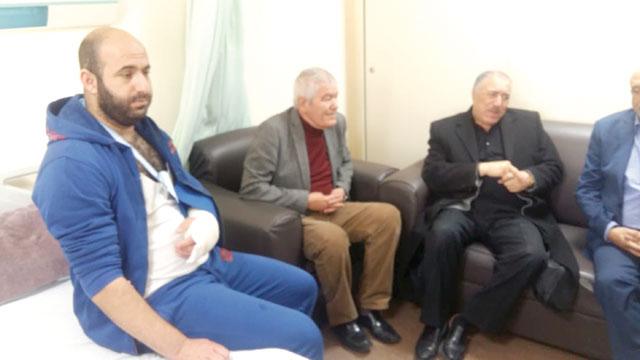You are here
Health Ministry, JMA seek remedy for violence against medical staff
By Dana Al Emam - Jun 11,2017 - Last updated at Jun 11,2017
AMMAN — While the Health Ministry claims that expanding the number of public security personnel at hospitals will curb violence against doctors, the Jordan Medical Association (JMA) insists that increasing penalties against violators is the best solution.
Since April 2016, 54 complaints of physical violence against doctors were filed in the courts, said JMA board member Hisham Fityani, who is in charge of monitoring violence against doctors for the JMA, noting that four to five incidents of verbal abuse occur on a daily basis.
In a recent phone interview with The Jordan Times, he said that incidents of violence against doctors and workers in the health sector in general have been increasing recently, particularly during Ramadan.
Meanwhile, the ministry’s Spokesperson Hatem Azrui on Sunday said that the ministry asked the concerned authorities to increase the number of security personnel at hospitals, particularly at “hot areas” like emergency rooms.
He explained that emergency rooms usually receive large numbers of visitors and some medically critical cases, a matter likely to increase tension, mainly in busy hospitals like Al Bashir Hospital in Amman.
Usually one or two security officers are present at emergency rooms for the sake of reporting accidents, but the plan is to increase the number of security personnel to 150, with 30 of them to serve at Al Bashir Hospital, Azrui said.
But JMA’s Fityani argued that the requested number of Public Security Department officers does not sufficiently meet the challenge, citing the damage resulting from vandalism of facilities as a contributing factor to the drop in the levels of public health services at already-understaffed hospitals.
Commenting on the legal aspect of the issue, the ministry’s legal consultant Radwan Abu Dames told The Jordan Times that doctors usually drop personal charges against violators at a “sensitive” time, an issue that “weakens” their legal position.
Responding to this, Fityani said doctors often drop charges because violators can obtain “fabricated” medical reports accusing doctors of responding to violence with violence, noting that such reports prompt doctors to drop their personal charges.
He also said that efforts at informal reconciliation, which do not involve the courts, help spread this “phenomenon”.
Abu Dames noted that penalties against public employees on duty were amended in 2011, to exceed the six-month period of imprisonment in article 187 of the Penal Code.
Meanwhile, he said the ministry supports imposing heavier penalties against violators, as such incidents of violence damage public property, put the lives of patients in danger and hinder doctors from doing their job safely and efficiently.
Violence against doctors and public servants on duty has become a phenomenon that requires a national stance, similar to that against festive firing, Fityani concluded.
In a recent interview with The Jordan Times, Minister of Political and Parliamentary Affairs Musa Maaytah said the Parliament’s upcoming extraordinary session will address a set of “key regulations”, including penalties for violence against public employees on duty.
Related Articles
AMMAN — The Jordan Medical Association (JMA) on Tuesday called on the concerned authorities to accelerate endorsing a proposed amendment to
AMMAN — Health Minister Ghazi Zaben on Sunday stressed that the ministry “will not be lenient” in prosecuting the perpetrators who attacked
The Jordan Medical Association (JMA) seeks to put an end to assaults against doctors by directly referring violators to the Attorney General’s Department, JMA President Hashem Abu Hassan said on Tuesday.
















